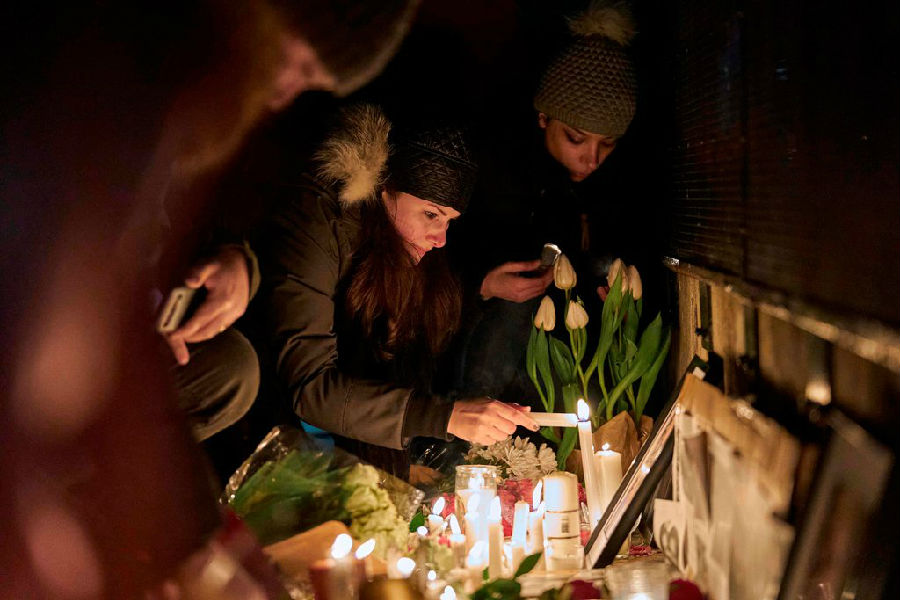and of violating universally accepted procedures for a post-crash investigation.
Bulldozers had heaped debris from the plane into piles on the ground.
Oleksiy Danilov, the Ukrainian security official overseeing the crash inquiry, said in an interview with The New York Times,
referring to how Iranian authorities had handled the site of the crash.
officials offered a mix of contrition and an insistence that Iran was not solely to blame.
官員們一方面表示懺悔,另一方面則堅(jiān)稱(chēng)伊朗并不是唯一的罪魁禍?zhǔn)住?/div>
Mr. Rouhani called the error an “unforgivable mistake.”
魯哈尼稱(chēng)伊朗政府此次犯下的是“不可原諒的錯(cuò)誤”。
General Hajizadeh, whose forces were responsible, said he had wished death upon himself because of the blunder.
其部隊(duì)對(duì)本次事故負(fù)有直接責(zé)任的哈吉扎德準(zhǔn)將表示,他曾希望自己以死謝罪。
Iran’s foreign minister, Mohammad Javad Zarif, wrote in an apology posted on Twitter:
伊朗外長(zhǎng)穆罕默德·賈瓦德·扎里夫在推特上發(fā)布了道歉聲明,聲明中寫(xiě)道:
“Human error at time of crisis caused by US adventurism led to disaster.”
“災(zāi)難是美國(guó)冒險(xiǎn)主義情緒引發(fā)危機(jī)這一時(shí)代背景下的人為失誤造成的。”
But the official expressions of remorse did nothing to mollify angry Iranians
然而,官方的懺悔未能安撫憤怒的伊朗民眾,
who only a few days earlier were united in outraged grief
幾天前,他們還聯(lián)合起來(lái),
over the American killing of a storied Revolutionary Guards leader, Maj. Gen. Qassim Suleimani.
憤怒地向被美國(guó)殺害的革命衛(wèi)隊(duì)著名領(lǐng)導(dǎo)人卡西姆·蘇萊馬尼少將致哀。
Now they were once again out en masse protesting their government.
如今,他們?cè)僖淮螢榭棺h他們的政府團(tuán)結(jié)到了一起。
Some protest images posted on Iranian social media even showed torn photos of General Suleimani.
伊朗社交媒體上的抗議照片中甚至還有蘇萊馬尼將軍的照片被撕毀的場(chǎng)面。

“Death to liars!” and “Death to the dictator!” shouted Iranians gathered in squares in the capital, Tehran, videos shared on social media showed.
社交媒體上分享的視頻顯示,聚集在首都德黑蘭各大廣場(chǎng)的伊朗人高喊道,“騙子去死吧!”,“獨(dú)裁者去死!”
“You have no shame!” shouted several young men, and the crowd joined in a chorus.
“你們真不知羞恥!”幾個(gè)年輕人喊道,接著,人群便開(kāi)始了齊聲附和。
In another tense spillover from the protests, the Iranian authorities briefly seized Britain’s Tehran ambassador, Rob Macaire,
在泄露出來(lái)的另一起場(chǎng)面頗為緊張的抗議活動(dòng)中,伊朗當(dāng)局還短暫扣押了英國(guó)駐德黑蘭大使羅布·麥凱爾,
for what news accounts in Iran called his “involvement in provoking suspicious acts” at a protest.
據(jù)伊朗的新聞報(bào)道,扣押原因在于他在抗議活動(dòng)中“參與了挑起可疑行為的活動(dòng)”。
Britain’s foreign secretary, Dominic Raab, denounced the seizure as a “flagrant violation of international law.”
英國(guó)外交大臣多米尼克·拉布譴責(zé)此次扣是“公然違反國(guó)際法”的舉動(dòng)。
Many protesters carried candles and placed flowers at the gates of the universities and other public places in Tehran.
不少人以在德黑蘭的大學(xué)及其他公共場(chǎng)所門(mén)口手持蠟燭,擺放鮮花等方式向罹難者致哀。
Conservatives and supporters of the government accused the authorities of intentionally misleading the public about what had brought down the plane.
保守派和政府支持者指責(zé)當(dāng)局在飛機(jī)墜毀原因方面故意誤導(dǎo)民眾。
Its passengers included many young Iranians on their way to Canada for graduate study.
飛機(jī)上有不少乘客是前往加拿大攻讀研究生的伊朗年輕人。
Criticism directed at Iran’s leadership came from all factions inside the country.
國(guó)內(nèi)各個(gè)派系都在指責(zé)伊朗領(lǐng)導(dǎo)層。
Even hard-line conservatives who exalt the military questioned its competence
就連一向?qū)姺匠指叨荣潛P(yáng)態(tài)度的強(qiáng)硬保守派也對(duì)軍方的能力,
and what they called the deliberate decisions by senior military officials to misinform the public.
以及他們所謂的高級(jí)軍事官員故意誤導(dǎo)公眾之舉提出了質(zhì)疑。
Hamideh Zarabadi, a member of Parliament from the conservative city of Qazvin,
來(lái)自保守城市卡茲文的國(guó)會(huì)議員哈米德·扎拉巴迪表示,
said Iran should hold a state funeral for the victims, prepare 176 coffins “and write on each of them, 80 million times, damn to war.”
伊朗應(yīng)該為遇難者舉行國(guó)葬,準(zhǔn)備176口棺材,“并在每一口棺材上寫(xiě)8000萬(wàn)遍‘戰(zhàn)爭(zhēng)該死’。”
Ms. Zarabadi’s comments were a slap at Mr. Khamenei
扎拉巴迪女士的評(píng)論無(wú)異于給了哈梅內(nèi)伊
and conservatives who had until Friday boasted about war with the United States
以及直到周五還在鼓吹和美國(guó)開(kāi)戰(zhàn)的保守派,
and their plan for “maximum pressure” to avenge Mr. Suleimani’s death.
還有他們對(duì)美國(guó)施以“最大壓力”,替蘇萊馬尼報(bào)仇的計(jì)劃一記響亮的耳光。
譯文由可可原創(chuàng),僅供學(xué)習(xí)交流使用,未經(jīng)許可請(qǐng)勿轉(zhuǎn)載。












